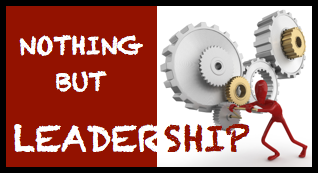“Make use of time, let not advantage slip.” ~ William Shakespeare
What Does It Take to be a Great Leader?

Every Tuesday, we’ll share valuable and practical leadership tips and tools to help you BE a better leader so you can BECOME a better leader. Remember … you won’t BECOME a better leader until you start BEING a better leader … implementing NOW the changes necessary to adopt the proven strategies of successful leaders. Start by taking a look at our communication matrix to make sure you’re working at improving your communication success.
___________________
Attention Span of a Mosquito?
How many times have we asked Are Distractions Destroying Your Brain? Whatever happened to that blank sheet of paper you were going to use to THINK, you know, that old-fashioned approach to problem solving and the creative process? Do we agree that Google is making us stupid?
These are but variations on a theme … our increasingly short term focus. We’re trying to do too much, keep track of a lot of stuff, fend off the intruders that keep pouring over the horizon … fighting today’s fires but missing the extraordinary value of a long term perspective.
“Our Time Horizon is Forever”
We’ve talked about Warren Buffet’s most recent shareholder’s letter. He’s well known for his long-term perspective, which infuses such homilies as “At Berkshire, our time horizon is forever” and “that to finish first you must first finish”.
Who else will balance the Short Term vs. the Long Term?
The key is to balance the need for short-term performance with the long term perspective that creates a lasting business. In our discussions about leadership, we have often referred to what only the CEO can do to focus on those special things that ONLY YOU can do.
Peter Drucker in The American CEO (full article requires WSJ login), supplemented by A.G. Lafley, former CEO of P&G, have written about what only the CEO can do … and one of their key findings is the importance of the balance between short and long term objectives. (Full article must be purchased from HBR.)
It’s correctly identified as one of the most important roles that a CEO must fulfill … because no one else has the knowledge, both inside and outside of the organization, to provide that balanced perspective.
Would you act differently?
What would you do differently as a leader (and in other aspects of your life) if your time horizon was truly long term? How would you make business decisions if you were thinking about what your business would look like in 5-10 years rather than next week?
Give it a try this week
My bet is that your decisions would be quite different. Try it this week. When a salesman asks you about how to get a higher price on a particular deal, stop and reflect on how it might affect your long term relationship with that customer.
Are you trying to squeeze every last nickel out every time?
Is your salesman focused only on maximizing his commission?
Is this really the best deal for the customer in every way?
The difference between long-term relationships and short-term performance
Many of you are thinking … easy for you to say.
“If we don’t get these next few sales this month, we may not be able to make payroll” … or some variation on that theme.
“We’ve got bills to pay, investments we need to make right now. We can’t ignore that for what we might be able to achieve in 2015.“
You’ve got to be present to win
There’s no question that current performance is life-sustaining. We can’t ignore it … but we can be mindful of our long term goals and make sure that a quick buck in the short term isn’t destroying our ability to build a lasting business. The salesman example is but one poignant reminder of the conflict between doing the right thing and thinking only of today’s success.
What is your perspective?
What are you doing to think long term? Are you encouraging your team to think long term or is this month’s performance the only thing on every one’s mind? Does it make any difference?
Maybe it’s time to lace that triple espresso with a long walk?


